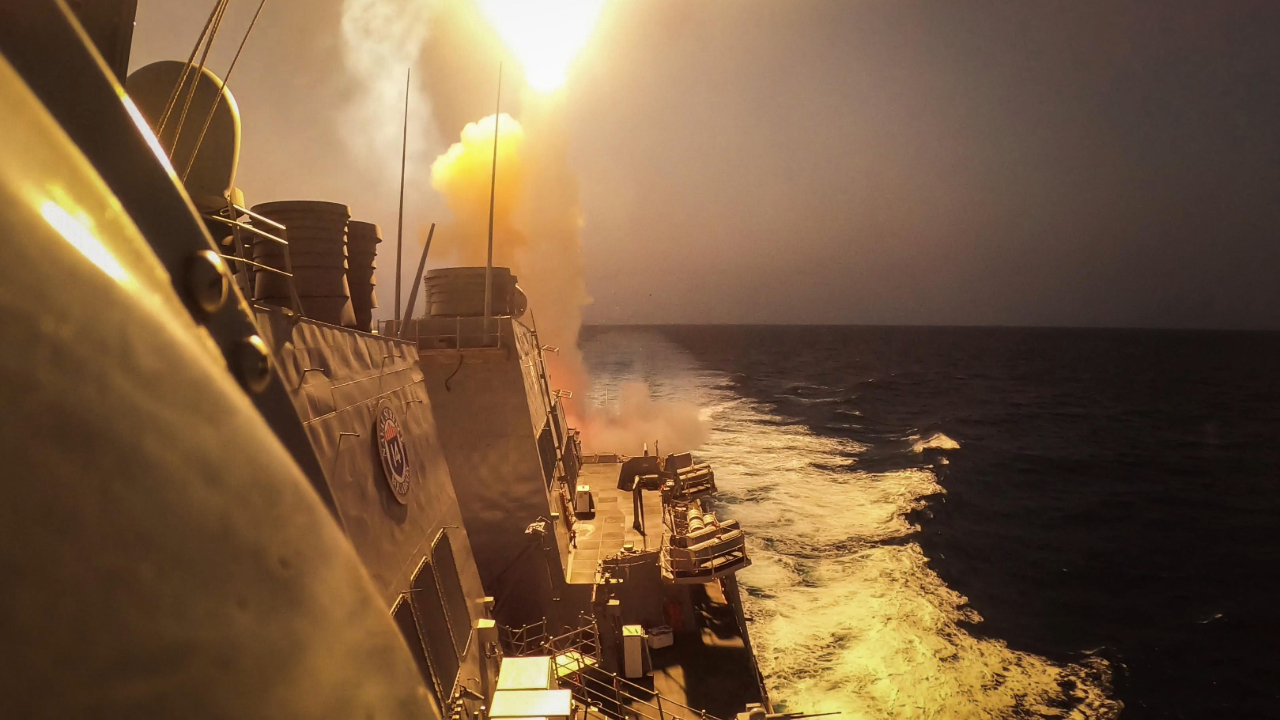
Why Europe Should Do More to Deter the Houthis
Washington should encourage its European allies to take a larger role not only in Ukraine, but also the Red Sea.
“Liberation Day” has come and gone, as President Donald Trump unveiled (and later withdrew) broad tariffs against trade partners throughout the world. The much-vaunted trade shake-up has thrown global trade into a tailspin, with the president initially promising that this move would give America renewed “economic independence.”
While many will focus on the financial merits or downsides to the reciprocal tariff policy, it is also crucial to point out the stark inconsistency it reveals in the Trump administration’s agenda. Particularly, why is the administration threatening to blow up global trade at home while bombing to support global trade abroad?
The president continues to demand that the Houthis cease their attacks on international trade and U.S. Navy ships in the Red Sea, and that Iran cease supporting the rebel group. This sentiment is echoed by his cabinet, with Secretary of Defense Pete Hegseth confirming that the campaign will continue until the Houthis agree to halt their attacks. The corresponding White House statement also emphasized the administration’s objective to safeguard international commerce. President Trump should consider an alternative approach, as his administration finds itself leading a military response that may not be sustainable or ultimately successful, for a cause it is otherwise at odds with.
President Trump remains committed to reversing what he sees as the errors not just of his predecessor but of American foreign policy across much of the twentieth and twenty-first centuries. Ranging from trade and immigration to the Panama Canal and NATO, the president is upending what were once thought to be mainstays of U.S. policy. However, the strikes in Yemen show that this objective has its limits, as they keep the United States enmeshed in Middle East conflicts. Instead, the president should continue to reverse outdated policies, as he is doing in other regions.
President Trump’s desire to peel Russia away from its deepening relationship with China has been dubbed a “reverse Kissinger.” President Eisenhower once pressured European powers to withdraw from the Suez Crisis in 1956 to avoid a conflict with the Soviet Union. The move eroded what remained of British and French influence in the region. This inspired the Eisenhower Doctrine, a strategy to increase U.S. involvement in the Middle East to combat Soviet influence, deepening American ties to the region to make up for Europe’s departure. A “reverse Eisenhower” would instead invite the Europeans back—this time to share responsibility for securing the trade routes they rely on.
Europe has only provided a modest response to the Red Sea crisis, yet it depends on that sea route for critical resources and 40 percent of its trade with Asia. Likewise, local Arab powers, such as Egypt, which relies on the Suez Canal for its survival, should be more enticed to act lest it continue to lose out on remittances from reduced traffic. America would continue to support its allies and partners but no longer play the lead role in the region, which has been a costly distraction for the United States.
Despite spending $4.86 billion in operations conducted in the Red Sea to protect commercial and military vessels from attacks while launching retaliatory strikes on Houthi positions, the United States failed to “restore deterrence” during President Joe Biden’s administration. Additionally, operations in the Red Sea burn through expensive and finite munitions needed in theaters that are more crucial to American interests, primarily the Indo-Pacific.
While the Houthis use cheap yet effective drones and missiles, the United States risks losing more $30 million MQ-9 Reaper drones. The Houthis have proven to be a particularly resilient foe when it comes to enduring air campaigns. Unless President Trump’s Pentagon has found a way to resolve or work around the issues that plagued previous operations against them, which seems in doubt given recent accounts from defense officials, this administration may suffer similar outcomes.
This could result in further erosion of U.S. credibility if the desired effect is not swiftly achieved. And even if this campaign does succeed in getting the Houthis to halt their attacks against American ships in the meantime, it may not last. Should the group remain intact, as statements from the Trump administration suggest is possible, there is little guarantee that they would not renew their campaign once they restore their capability or sense that the United States is preoccupied with another issue. Absent persistent strikes against Houthi assets or a diplomatic breakthrough in the Middle East, a long-term assurance against these attacks would require a prolonged arms interdiction operation around Yemen or completely defeating the Houthis.
The burden of securing trade through the Red Sea and the Suez Canal should ultimately be shouldered by those who have the most significant interest in it, primarily European and Middle Eastern states. As Vice President JD Vance noted in the leaked Signal chat, the United States has warned its European allies to become less dependent on America in the context of the Russia-Ukraine War. This sentiment should be expanded to other areas where the Europeans need to be more proactive in securing their interests. Additionally, it seems counter-productive to conduct a military campaign to secure trade routes for countries with which America will be in a trade war.
President Trump’s campaign against the Houthis is at odds with his broader agenda and may stymie America’s attempts to draw down deployments in a region of increasingly less importance for the United States. Encouraging nearby powers with greater stakes in the Red Sea and Suez trade to become more self-sufficient partners will align with his goal to undo the mistakes of prior administrations. The next “Liberation Day” should liberate Americans from Middle East conflicts.
Chad Kunkle is a Winter 2024 Marcellus Policy Fellow at the John Quincy Adams Society. Read more about his work on the Red Sea crisis here.
Image: Defense Visual Information Distribution Service